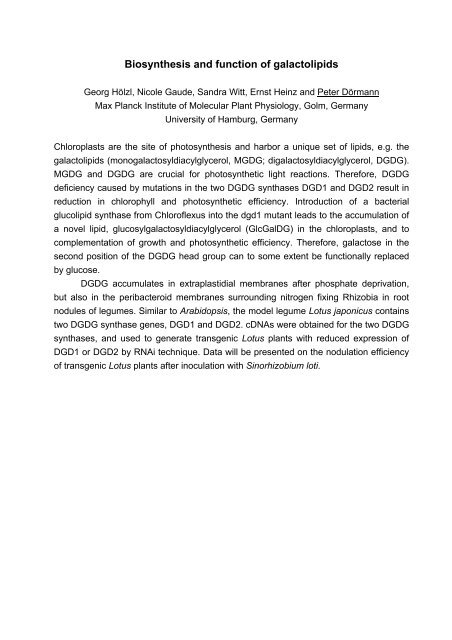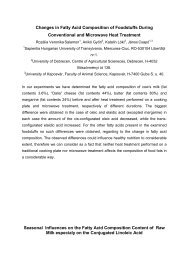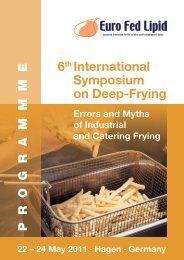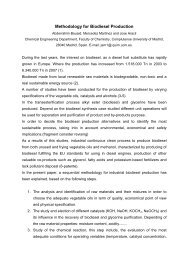Abstracts now available online - Euro Fed Lipid
Abstracts now available online - Euro Fed Lipid
Abstracts now available online - Euro Fed Lipid
Create successful ePaper yourself
Turn your PDF publications into a flip-book with our unique Google optimized e-Paper software.
Biosynthesis and function of galactolipids<br />
Georg Hölzl, Nicole Gaude, Sandra Witt, Ernst Heinz and Peter Dörmann<br />
Max Planck Institute of Molecular Plant Physiology, Golm, Germany<br />
University of Hamburg, Germany<br />
Chloroplasts are the site of photosynthesis and harbor a unique set of lipids, e.g. the<br />
galactolipids (monogalactosyldiacylglycerol, MGDG; digalactosyldiacylglycerol, DGDG).<br />
MGDG and DGDG are crucial for photosynthetic light reactions. Therefore, DGDG<br />
deficiency caused by mutations in the two DGDG synthases DGD1 and DGD2 result in<br />
reduction in chlorophyll and photosynthetic efficiency. Introduction of a bacterial<br />
glucolipid synthase from Chloroflexus into the dgd1 mutant leads to the accumulation of<br />
a novel lipid, glucosylgalactosyldiacylglycerol (GlcGalDG) in the chloroplasts, and to<br />
complementation of growth and photosynthetic efficiency. Therefore, galactose in the<br />
second position of the DGDG head group can to some extent be functionally replaced<br />
by glucose.<br />
DGDG accumulates in extraplastidial membranes after phosphate deprivation,<br />
but also in the peribacteroid membranes surrounding nitrogen fixing Rhizobia in root<br />
nodules of legumes. Similar to Arabidopsis, the model legume Lotus japonicus contains<br />
two DGDG synthase genes, DGD1 and DGD2. cDNAs were obtained for the two DGDG<br />
synthases, and used to generate transgenic Lotus plants with reduced expression of<br />
DGD1 or DGD2 by RNAi technique. Data will be presented on the nodulation efficiency<br />
of transgenic Lotus plants after inoculation with Sinorhizobium loti.
















